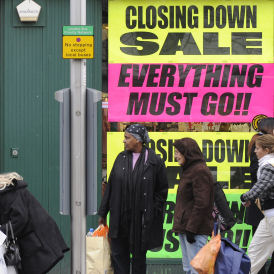TJ Hughes falls victim to High Street decline
As department store chain TJ Hughes teeters on the brink of administration, Channel 4 News learns two other fashion retailers are under threat in the slump on the British High Street.
The Liverpool-based discount department store chain said on Tuesday that it intends to appoint an administrator over the next 10 days unless a buyer can be found for the business.
Around 4,000 jobs across 57 stores are at risk at the chain, which was bought out by its management team in March following a difficult trading period.
If no rescue plan succeeds for TJ Hughes, it will join the furniture chain Habitat and fashion retailer Jane Norman in going into administration in a torrid few weeks for the retail sector.
“Ultimately the High Street needs restructuring. Unless this can be done, the High Street is in terminal decline.” Jonathan De Mello
The year so far has been an exceptionally tough one for shops, as consumers hit by spending cuts and rising inflation cling to their cash. Household incomes took their biggest tumble in 30 years in May.
Other casualties so far include The Officer’s Club, Oddbins, Focus DIY and Life and Style Retail, the fashion business formed from the remnants of the Ethel Austin fashion chain which collapsed in March 2010.

Feeling the retail pain
Many other retailers have warned that they are feeling the pain. Chocolate retailer Thorntons has said it plans to close up to 180 stores over the next three years. Other High Street stalwarts including HMV, Game, Dixons and JJB Sports are slimming down their estates, and Mothercare is cutting 110 shops to focus on out-of-town retail.
HomeForm – the owner of Moben kitchens, bathroom chain Dolphin and Sharps bedrooms – has also announced its plans to appoint administrators in coming days.
On Tuesday Carpetright reported a 70 per cent slide in full-year profits and warned it would have to close more stores to try and weather the storm. In total, around 870 shops have either closed or are at risk in recent weeks. And Channel 4 News has learned that at least two more fashion retailers are at risk of collapsing into administration in the next few weeks.
Why are so many retailers in trouble now?
Shop rents are paid in advance every quarter on “quarter day”, the most recent of which was 24 June. This puts retailers under pressure because they have to pay large lump sums in advance, which is a strain on their cashflow, particularly if they have had a difficult trading period previously. If they cannot pay, they have to negotiate a deal with their landlords. If they cannot, this is often a factor which pushes them into administration as they run out of money to pay rent and other suppliers.
“Often there’s a 14 day period of grace for retailers to pay so that takes them up until the first week of July. It’s possible we will see more retailers fall over then,” consultant Barry Gilbertson told Channel 4 News.
“Put it this way, it’s hard to imagine many retailers out there clapping their hands with joy at the moment. The only good thing is if their competition goes under, they have a better market share.”
The head of retail consultancy at property firm CB Richard Ellis, Jonathan De Mello, said the situation was likely to get worse as the unstable economic picture continued.
“There are two retailers in the fashion sector we are aware of which are at risk,” he said, but declined to give any further detail.
Mr De Mello said the recession had “pushed shops over the edge”, but stressed that the raft of administrations, profit warnings and shop closures was linked to a wider decline of the British High Street, due to the rising popularity of internet shopping and the lack of town centre strategies aimed at improving the shopping experience to combat their online competition.
“There are a number of retailers at risk overall,” he said.
“Ultimately the High Street needs restructuring. It has been in decline for some time. Local authorities and landlords and retailers need to work together to add value, to focus on the things consumers cannot get on the internet – eating out, leisure. Unless this can be done, the High Street is in terminal decline.”